The Kings and Queens of England
by Esmerelda Weatherwax (March 2010)
Kings
The most popular pub King seems to me to be Henry VIII.
Inset left in Cromer with the tower of SS Peter and Paul in the background.
Here he is below as a young man enjoying a pint and a cigar in Bradwell on Sea, and ruling Hell’s kitchen in Billericay. Then as the stout and fierce older man in Borough, Rochester and West Tilbury.
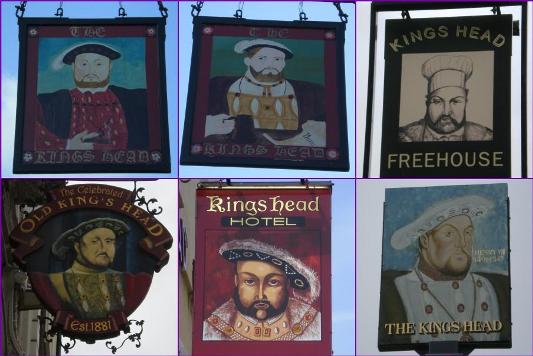
Other kings from left to right and top to bottom starting with the earliest.
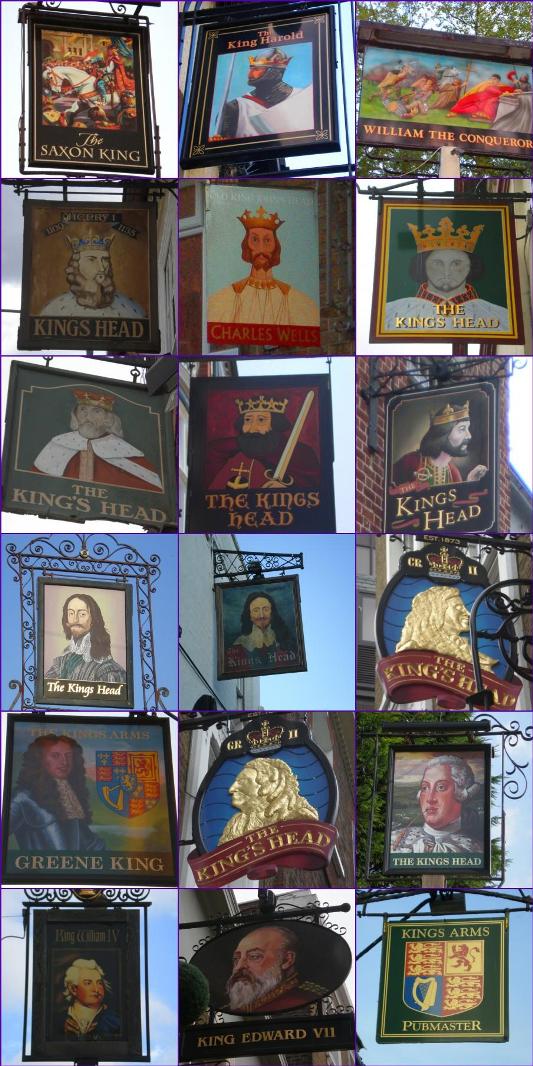
The Saxon King Harold Wood. The King Harold and the William the Conqueror in Harold Hill.
Henry I from Thetford. Old King Johns Head Shoreditch. Assorted mediaeval kings from Norwich, West Ham (now a hotel for migrant workers at the Olympic site) Gravesend and Wells Somerset.
Charles I in East Bergholt Suffolk and Southminster. Charles II in Mayfair.
James II in Bradford on Avon Wiltshire, George II in Mayfair and (I think) George III in Sawston Cambridgeshire.
William IV in Leyton, Edward VII (the King of Prussia until 1915ish) Stratford E15 and the Kings Arms Swaffham.
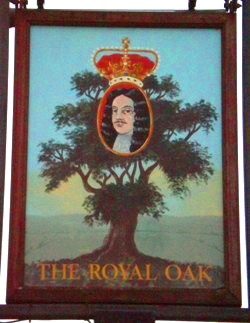 I am quite surprised to have only found one depiction so far, and that only a silhouette, of Charles II. He does turn up in numerous Royal Oaks, as in the Royal Oak at Havering atte Bower left, but I thought a man of his reputation and popularity as the Merry Monarch would have graced a few more King’s Heads. I know of two George V pubs. One has no sign, the other depicts the George Cross medal. I have not yet come across any depiction of King George VI.
I am quite surprised to have only found one depiction so far, and that only a silhouette, of Charles II. He does turn up in numerous Royal Oaks, as in the Royal Oak at Havering atte Bower left, but I thought a man of his reputation and popularity as the Merry Monarch would have graced a few more King’s Heads. I know of two George V pubs. One has no sign, the other depicts the George Cross medal. I have not yet come across any depiction of King George VI.
Queens
Queens are very popular, both the 6 Queens Regnant and the wives of kings.
Victoria is particularly popular, in the form the Queen’s Head, the Victoria or Queen Victoria. I have not watched East Enders for ages but in the early episodes the rival pub, was the Dagmar. It became a wine bar and was burnt down in a revenge attack by Dirty Den, landlord of the Queen Vic.
Princess Dagmar was the sister of Queen Alexandra. Her state title was Maria Feodorovna, Empress of Russia. The Dagmar Arms in Hackney and the Dagmar Arms in Tottenham have both been demolished. There is a pub of that name in Sunderland and at least one in Wales. Pubs called the Rose of Denmark are likely to have been named after Queen Alexandra.
These photographs are of :-
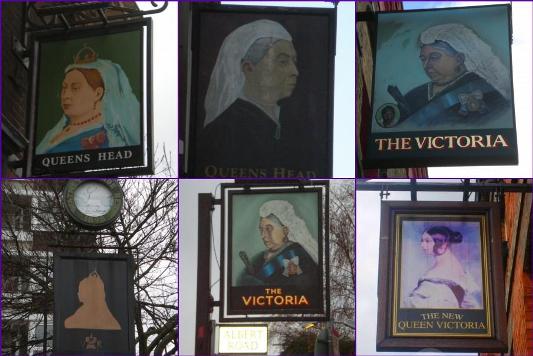
The Queens Head Stratford E15, The Queens Head Theobalds Road (closed 2009) The Victoria Hackney, The Victoria Plaistow, The Victoria Romford, The New Queen Victoria Wolverton. This last picture is the work of John McGraw taken from the Pubsgalore website. I use it because I don’t have a sign of my own featuring the Young Victoria.
The picture used in Hackney is interesting. The artist seems to have used as his base the same portrait used in the Romford sign with the addition of a black lady and islands in the background. I have a feeling she is Mary Seacole the Crimea nurse from Jamaica. I could be wrong and I have not had sufficient time to do any research as this is from my most recent outing last week.
The wives of Henry VIII are of perennial interest.
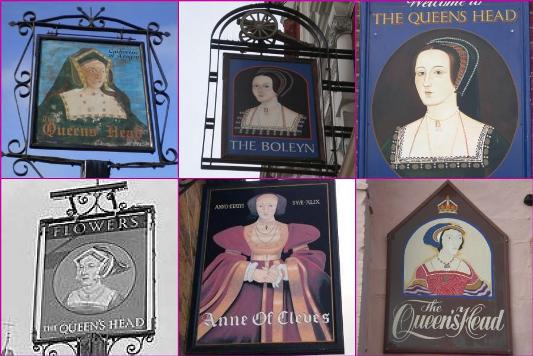
The Queens Head in Southminster is a portrait of Catherine of Aragon.
The Boleyn Tavern in Upton Park, is, of course Anne Boleyn. West Ham United’s ground is called the Boleyn Ground; my uncle the Hammers fan insists that the Boleyn family owned the land the ground was built on and around about. They may well have done. What is interesting is that it is pronounced differently. The original family name was Bullen. They started calling themselves Boleyn about the time that Anne was sent to France to learn polish at the French court, all part of their aspirations for higher things. When talking of Anne in a historic sense most people pronounce the name Bow-lynn. The football ground is pronounced Bowlin’ like bowling with the emphasis on the second syllable. I don’t know why but the London accent is like that.
The Queen’s head in Maldon, taken by my father-in-law is also Anne Boleyn.
The next two pictures are not my own work, nor that of my circle of friends and family.
During the 1950s The Queens Head Sandridge Hertfortshire featured Jane Seymour. This is the work of John Gay in black and white.
The Anne of Cleves pub in Melton Mowbray Leicestershire looks wonderful. The whole of this site, Scenes from the English Midlands is worth a browse.
The former Queens Head Sawston Cambridgeshire is, from her dress one of the wives of Henry VIII but I have no idea which one. I took more photographs of the other signs at that closed pub which you can see below.
So far I have not come across any definite signs for Katherine Howard or Catherine Parr.
Other queens from left to right and in date order.
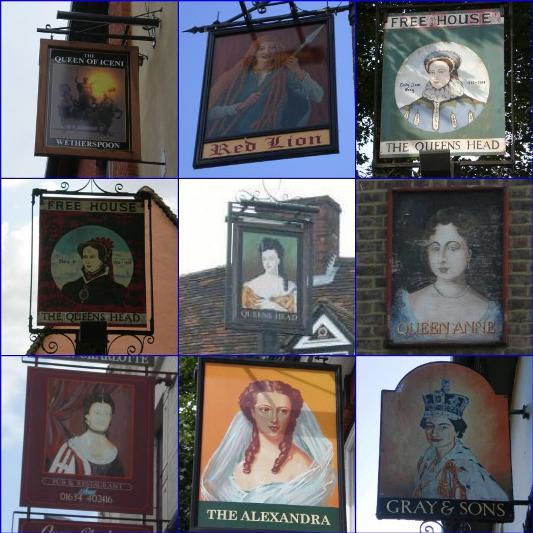
The Queen of the Iceni Norwich Riverside.
The Red Lion Thetford.
Both Boudicca as you may have guessed, and both pubs are in the old heartland of the Iceni tribe. There is a pub in Maidstone called the British Queen also featuring her. I went past it last year but my friend’s husband was driving us, and it is unreasonable to expect other people’s husbands to be as enthusiastic as my own.
The former Queen’s Head in Sawston Cambridgeshire. Lady Jane Grey and Mary I. I believe that this sign is unique in depicting Lady Jane Grey, the nine days Queen. I decided to visit Sawston last year on my way to Norfolk. The rest of the family had gone ahead so I had an hour or two to explore. I’m heartily glad that I did as I found the pub closed and boarded up with a sign saying that planning permission was sought to “add an extension and internal alterations” to make this 15th century listed building into a “5 bedroom residence”. I don’t know what had happened to the signs but I noticed the building for sale again last month with planning permission to become a 4 bedroom home. The building will remain, and be used and loved but I doubt the signs will be incorporated into that home. Lady Jane Grey and Bloody Mary were either side of the same board. The picture on the wall was in a different less delicate style.
This next picture is again not my own work. I used a B&W photograph of the Queens Head in Sandridge above. I was curious what it looked like now so I went back to the Pubs Galore site. This photograph is by Clive Thompson and looks to me like Queen Mary II. She was the daughter of James II and wife of William III who reigned with her.
The Queen Anne Vauxhall. Queen Anne was the younger daughter of James II
This pub sits in the sparse park which is all that remains of the 18th century Vauxhall Pleasure gardens. The day in 2004 that the Lord Chancellor’s department was suddenly abolished our unit head took his shaken team to the pub. The pub he chose was the Lavender nearby. As it was a nice day we sat on the grass and watched the goings on in and out of the Queen Anne which is now a venue for ‘Exotic Dancers’. Not that they looked very exotic, munching their MacDonalds at the park bench while they waited for their shift to start. We decided that they were really secret agents and that the Queen Anne was the entrance to a secret tunnel which runs to the MI6 building at Vauxhall Cross.
The Queen Charlotte Rochester. Wife of King George III. One of the 100 Great Black Britons due to her African/Portuguese ancestry.
The Alexandra Warley. I mentioned Alexandra of Denmark above. She is very young in this picture so it must be depicting her when she was still Princess of Wales.
The Queens Head, Burnham-on-Crouch. Our Queen Elizabeth II in her coronation robes.
I have not yet come across any sign showing the Queen Mother or Queen Mary, wife of George V.
Queen Elizabeth I, aka Good Queen Bess or Gloriana.
I expected to see more of her. I have a feeling that outside London there are more and that the popularity of Queen Victoria is an urban, maybe only a London thing.
Some of the Kings and Queens above, like Boudicca and King Harold are drawn from the artist’s imagination. Other follow verified portraits. In 2006 the National Gallery bought what they believe to be the only verifiable portrait of Lady Jane Grey. Tudor historian David Starkey said of it: “It’s an appallingly bad picture and there’s absolutely no reason to suppose it’s got anything to do with Lady Jane Grey”.
Dr Tarnya Cooper of the National Portrait Gallery responded “Who says all pictures of monarchs have to be masterpieces? A great number of contemporary portraits of Elizabeth I look like pub signs.”
Or more accurately, a great number of pub signs follow contemporary portraits. Some artists are better than others; some pub signs have withstood wind and weather better than others.

I took the photographs of portraits of Queen Elizabeth from my copy of David Starky’s Elizabeth Apprenticeship. When my husband came home with pictures of the Queens Head at Fyfield he thought they were of Elizabeth and her mother Anne Boleyn. The first I believe to be modeled on the portrait to the right where she is wearing red. This is from the Queen’s Collection and attributed by some to William Scrots. It was believed to have been painted during the last year of King Henry’s life when she was aged about 14.
The sign that used to hang on the former Queen Elizabeth in Hackney is based on the Coronation portrait, although the artist preferred her older curly wig image. The pub closed in 2007 but the sign remained for some years. However when I made a trip to photograph it last week it had been removed, quite recently from the freshness of the marks left where it had been. So I have had to use the work of John McGraw from Pubsgalore.
Ye Queen’s Head in Glastonbury is also one of my husband’s photographs and is not dissimilar to the famous Armada portrait to the right.
The Queens Head Littlebury (below left) and Queens Head Fyfield (below right) look similar and there is no need for me to over labour my point by searching for more contemporary portraits.
Future visits. There is a Queen Edith just outside Cambridge, near Queen Edith’s chapel and a visit to Cambridge is long overdue. As I said above I am sure that there are more heads around of Queen Elizabeth, and King Charles II. Suggestions to look out for welcome.
To comment on this article, please click
If you enjoyed this piece and would like to read more by Esmerelda Weatherwax, please click here.
To help New English Review continue to publish articles such as this one, please click Esmerelda Weatherwax is a regular contributor to the Iconoclast, our community blog. To view her entries please click here.